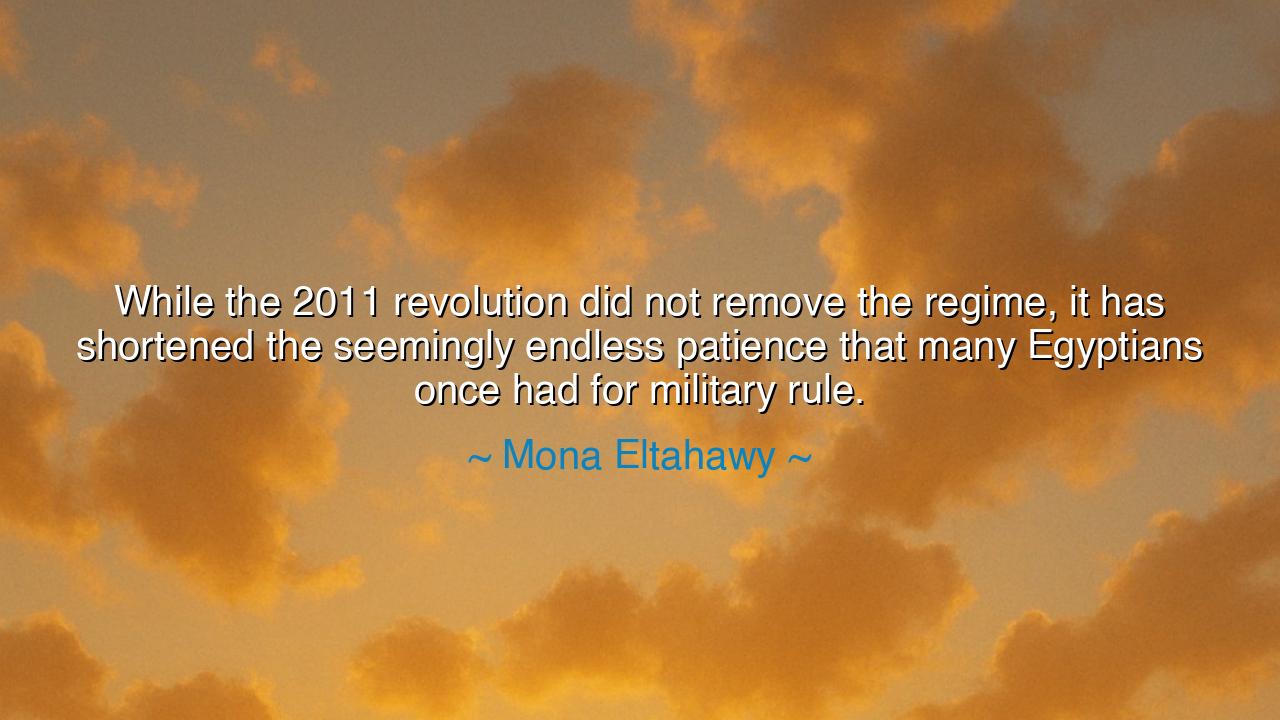
While the 2011 revolution did not remove the regime, it has
While the 2011 revolution did not remove the regime, it has shortened the seemingly endless patience that many Egyptians once had for military rule.






Hear the words of Mona Eltahawy: “While the 2011 revolution did not remove the regime, it has shortened the seemingly endless patience that many Egyptians once had for military rule.” These words carry the weight of history and the fire of awakening. They remind us that though a single uprising may not shatter the walls of power, it can shake the very foundation of submission. For when a people rise together, even if they do not fully triumph, they forever change their own hearts—and from that moment onward, the chains that once seemed bearable grow too heavy to endure.
The 2011 revolution in Egypt was a moment when the voices of millions filled the streets, echoing in Tahrir Square like thunder. Young and old, men and women, rich and poor—they stood side by side and declared that dignity, freedom, and justice were worth more than fear. Though the regime did not fully collapse, though old powers returned to claim authority, the spirit of the people was transformed. The long patience that had allowed decades of military rule began to dissolve. Once a people have tasted their own strength, they cannot return easily to silence.
History gives us mirrors of this truth. Consider the storming of the Bastille in 1789. That single day did not end monarchy in France; the years ahead were filled with blood and turmoil. Yet in that act, the people learned that they had power, that kings could be defied, that centuries of endurance could be swept away in a moment of courage. The monarchy might stagger on, but the people’s patience was forever shortened. What was once tolerated could no longer be endured. So too in Egypt: the 2011 revolution planted a seed that no soldier’s boot could fully crush.
Eltahawy’s words reveal that revolutions are not measured only in the overthrow of governments, but in the transformation of souls. A people once resigned now carry the memory of defiance. Even when rulers return, they rule under a cloud, knowing that their subjects have risen once and may rise again. This is why power fears protest, why regimes crush dissent so fiercely—for they know that the greatest victory of an uprising is not the fall of a palace, but the breaking of the myth that the people’s patience is endless.
Yet her wisdom also carries sorrow. For military rule remains, and freedom is not yet won. The fire of revolution is difficult to sustain; many fall back into fear, exhaustion, or despair. But still, the threshold has been crossed. The people will no longer accept the unbearable as though it were natural law. This shift is subtle yet profound: it is the difference between being ruled by force and being ruled only so long as one’s anger sleeps. The rulers may sit on the throne, but they sit uneasily, for the people’s endurance has grown short.
The lesson, then, is that no act of courage is wasted, even if it does not bring immediate victory. The very act of standing against tyranny reshapes the people’s spirit, loosens the grip of fear, and shortens the life of oppression. Every cry, every march, every sacrifice becomes a thread in the fabric of future freedom. The 2011 revolution reminds us that even when the present seems unchanged, the future has already begun to shift.
Practical wisdom follows for us all: do not despise small victories, nor lose heart when change comes slowly. Understand that revolutions of the spirit are as vital as revolutions of the state. Wherever injustice reigns, speak, resist, and act, even if the fortress of power does not fall at once. For each act chips away at the people’s false patience, and one day, the weight of all those moments will tip the scales.
Thus, let Mona Eltahawy’s words be remembered as a teaching: the regime may endure for a season, but the people have changed forever. Patience for tyranny is not infinite. When the people rise once, they will rise again, until their rulers learn that true power rests not in armies, but in the awakened will of the nation.






AAdministratorAdministrator
Welcome, honored guests. Please leave a comment, we will respond soon